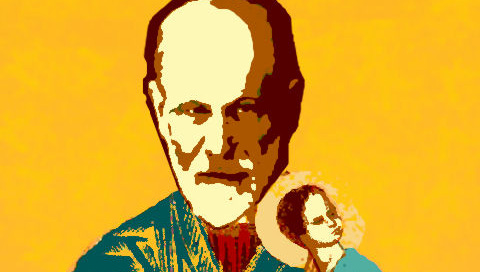Sang Freud
A Deep Reading of Why Freud Was Wrong: Sin, Science and Psychoanalysis, by Richard Webster
Part One: Freud’s Messiah Complex
(Art by Michelle Horsley)
A Cautionary Disclaimer
This will be a cautionary tale. One of the morals—especially timely in the age of Donald Trump and what is possibly the biggest controlled opposition psyop in US history—is that our enemy’s enemy is not our friend.
In this case, the stage is a literary and not a geopolitical one. Yet that also makes it much closer to home, since I am a writer and my primary—perhaps only—public responsibility relates to words and how they are used. Specifically, to—a rather passé concept in the age of open AI—journalistic integrity.
Richard Webster’s Why Freud Was Wrong (HarperCollins, 1995) is a long book (600+ pages) and this will be a long series (the text I am editing is just under 25,000 words). It begins by using Webster’s words to try to break the spell of Freudianity, which—he convincingly argues—the western world has been under for well over a hundred years (Freud began his ministry in the mid-1880s). It ends by using Webster’s words to expose Webster’s own thinking as, in its way, every bit as delusional and pernicious as Freud’s was—albeit a lot less influentially so.
The lesson is sobering: however skilled Webster was at routing the errors and lies of Sigmund Freud, it didn’t prevent him from propagating his own. And in some ways, Webster may even be guilty of roughly the same crimes as the subject he is so diligently deconstructing and denouncing.
“Battle not with monsters.”
I want to get this out of the way at the start, so that the reader is forewarned and fore-armed, regarding “How Richard Webster Was Wrong.” The short version is that—as I suspected while reading latter passages of the book—Webster was an advocate and a spreader of “mass hysteria” dismissals of organized child sexual abuse and—by inevitable extension—a protector-defender of likely perpetrators of hideous crimes (see here for an overview: https://beatrixcampbell.co.uk/the-secret-of-richard-webster/).
Webster died in 2011 at only 60 (“of natural causes” according to Wikipedia). From a cursory look at his biography, it seems that, besides his (celebrated) book on Freud, he was busiest and most influential in terms of pushing the “mass panic” narrative around various cases of organized child abuse, i.e., a shill. Had I know this before ordering his book on Freud (which someone recommended in the comments, here at CoJ), I never would have read it, since my distaste for such shills is extreme.
I am glad I did read the book, however, especially since, in the last part of my commentary, I began to express my dislike for Webster more and more; not because I suspected he was an apologist for pedophiles, but because his personal outlook became more and more obviously dubious (his anti-Christian bias was the first obvious sign).
The short version is that Webster’s reportage on Freud, and his interpretation of the data he presents, seems to me sound and mostly convincing; and, regardless of his shortcomings in moral intelligence or true insight, I feel we must take our exposés where we can get them.
Why Freud Was Wrong is a very good exposé of Freud—even if it was written by an author who himself requires exposing—and it is only when the book veers into “deep” philosophical proselytizing that its author’s limitations become painfully apparent (he was only 46 when the book was published).
That is when my criticism will shift from the subject, Freud, to the author, Webster.





